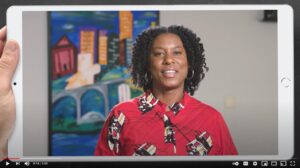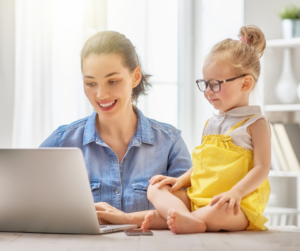Educator Reflections on Pandemic Positives
THERE IS SOMETHING ABOUT SEEING A TEACHER’S CRYING TODDLER WANDER INTO A ZOOM MEETING THAT SCREAMS, “WE ARE ALL HUMAN HERE!”


Contributed by Julie Lanigan, educational services coordinator,
and Christine Zanoni, educational services coordinator
Wait. What? Does that title really say, “Pandemic Positives?” Is that even a thing?
Yes, dear reader, as hard as it may be to believe, the title does say, “Pandemic Positives.”
Most of the time, being an educator during a pandemic feels overwhelming. Did you know, for instance, if you google “learning loss because of COVID,” Google will literally provide you with 829 million webpages on the topic? Last week, after watching yet another webinar inundating educators with suggestions on how to do a better job, we were feeling particularly defeated. In short, it was the perfect time to pause and reflect on the positives. Of course, by doing this, we’re not dismissing the hardship and extraordinary challenges the pandemic creates. Instead, we’re simply shifting our focus to the very real reasons we have to celebrate.
A Successful Transition to Remote Learning
In March, Positive Education Program was woefully unprepared to conduct online learning. Almost none of our students had computers and many had no Internet access. Our teachers did have

computers in their classrooms, but they were desktops with towers that could not be taken home easily. Even if we had had the equipment, our website wasn’t set up for online learning and we had not planned for the major capital expense of making these kinds of purchases.
Yet somehow, by a seemingly coordinated set of miracles, after only a few months, every single student and every single teacher now have the tools they need to have school online. Generous donors provided funding, our operations team hunted down enough computers amidst a national shortage, our operations team and IT teams coordinated outreach and developed systems and programs for these devices, our communications team created a new website portal for learning, our IT team configured all the computers, and our educators and mental health staff devised ways to provide daily instruction and interaction to meet our kids’ educational and social emotional needs remotely (and now hybrid, as well). Staff from across the entire organization came together to make it possible. I mean, WOW! If that isn’t a cause for celebration, I don’t know what is!
New Valuable Life Skills
There is a lot of talk lately about learning loss, as is obvious from the Google search results mentioned above. But what is missed in these discussions is another one of our pandemic positives. We are actually learning A LOT right now. Almost all our students who are able, now know how to navigate a computer, go online for answers, and get on a Zoom meeting, for instance. And, as we’ve faced hurdle after hurdle, we’ve learned something even more important: resilience.
Generous Collaboration
PEP staff have always been collaborative, but in another manifestation of pandemic positives, they’ve taken it to a whole new level. Where in the past there may have minor territoriality about special ideas in the classroom, today there is nothing but a sense of “we’re all in this together.” It brings the ingenuity of each team member to the forefront and creates a sense of community.
What’s more, this sense of collaboration extends well beyond PEP’s figurative walls. Educators from around the country – and even around the world – are openly sharing ideas. This openness and spirit of collaboration has pushed us to explore new videos and platforms. It has broadened our horizons and made us feel less alone. That’s no small feat in today’s isolated world of lock downs and quarantines.
More Opportunities for Growth and Development
As the world began to shift operations online, organizations that provided professional development for educators realized they were no longer constrained by who could physically attend their sessions. They also realized they could provide valuable content without holding a live session. As a result, there has been a proliferation in on-demand programming. These are programs that simply would not have been available to educators in the past. Prior to COVID-19, most professional development programs were relatively expensive, required at least local travel and possibly time off work. Today, there are a lot of programs that are free. Educators have the flexibility to “attend” them whenever it works in their schedule.
 Deeper Compassion
Deeper Compassion
There is something about seeing a teacher’s crying toddler wander into a Zoom meeting that just screams, “We are all human here!” Conducting school remotely has meant we see each other’s humanity. Seeing peoples’ lives play out behind them during Zoom meetings constantly reminds us of each other’s situation. We realize that no one is just a teacher. No one is just a student. It helps us feel connected and better empathize with one another. These connections allow us to let down our guards some. It has even led to moments of fun and levity — a crucial element of our traditional classroom setting at PEP that now carries over to the remote classroom. (Did you know Zoom has bunny ears and other filters students can “wear” during class?)
Just Manageable Difficulty
Dr. Nicholas Hobbs, the founder of the Re-EDucation philosophy that provides a foundation for PEP’s work, often spoke about the concept of “just manageable difficulty.” Hobbs believed that conquering challenges at the edge of one’s competence provided children with an opportunity to, “move oneself in the direction of what he [or she] would like to become.” At PEP, we nurture this belief in our kids.
Almost a year into our new reality, I think we’re all familiar with what it feels like to “hit the pandemic wall.” Yet, our embrace of the Re-ED philosophy in many ways makes the trials more manageable. From the moment they come to us, we encourage our kids to face challenges they may not believe they can overcome. Now, after succeeding many times with “just manageable difficulties” they know they can rise to the challenge. They are more confident and competent and are proud of their ability to persevere. And that goes not just for day-to-day challenges but the ones we’re facing now in the pandemic.
Yes, it can be very hard to appreciate the good things when we’re all living in a daunting new reality. But, taking a moment to deliberately reflect on the pandemic positives can be the boost we need during hard moments. We are all waiting for the day when things can return to some semblance of normal. Until that day, we hope that when it all feels like too much, you too can pause to remember that there are rays of hope even in the darkest of times.
